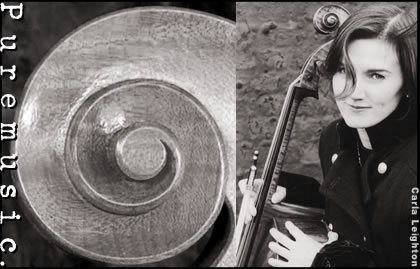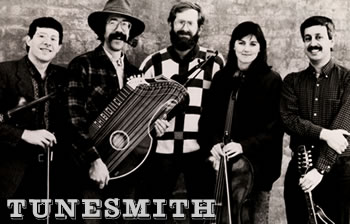
A Conversation with Stephanie Winters (continued)
SW: When I graduated with my bachelor's in Cello Performance, I just--I had gotten into this Juilliard kind of classical head, having to practice five hours a day. I had done that--that's a lot of where I'd developed my technique--but it became such a burden. And every day just felt like it was about practicing. A lot of times I didn't get it done until night, and then I'd wake up the next morning and have to face that obligation again. So I quit once I got my bachelor's. And I actually quit for five years.
PM: Wow.
SW: And then I started playing guitar and teaching guitar and getting into that.
PM: Did you pick up guitar from scratch at that point?
SW: Yeah.
PM: You just said to yourself, "Enough of this shit, I'm going to play something else."
SW: "I'm going to play a different kind of music that has nothing to do with anything I've done." And I did. And I started teaching guitar, because my teacher, Valerie Mackend, needed an assistant. It came to me very easy, because I had a lot of coordination from playing the cello.
PM: Yeah. And what kind of music were you playing on the guitar?
SW: Beatles and Paul Simon and--
PM: Pop music, basically.
SW: All sorts of folk rock pop stuff.
PM: So you didn't drift into a classical approach.
SW: Not at all. I had no interest. Yeah, I played steel string guitar.
PM: Finger picking and stuff like that?
SW: Yeah, finger picking and strumming, just sort of your basic cowboy chords.
[laughter]
SW: I taught all beginners. At one point I had about thirty private students, and I taught classes at the New School. I taught pretty much full time. But it wasn't a teaching job with benefits. I've always been freelance.
PM: Did many of your guitar students know that you were a rather masterful cellist?
SW: No. At that point I wasn't even playing. My colleagues knew that I had played. And then a friend of mine needed a sub for her beginner cello class. And I hadn't played and I hadn't touched a cello, and I thought, "Well, it's a beginner cello class with kids, I mean, I can certainly manage to get through that." So I started playing again by demonstrating for the kids. It would have been much more difficult if I hadn't been playing guitar, but even so, the amount of skill you lose is frightening.
PM: Yeah.
SW: I mean, I slipped to being like an intermediate player at best. I couldn't play in tune. It was really--
PM: Scary.
SW: It was a scary long haul back.
PM: After all those years of five hours of practicing, oh, wow.
SW: Yes. And if you don't play for years, you really lose it.
PM: Heartbreaking.
SW: And then my friend quit her job, and they offered me the teaching job teaching cello. So now I was teaching five mornings a week for an hour, playing strings. And then when I told people that I had been a cellist, the people who are in the songwriter world asked me to play cello because they needed a cellist. I wasn't really looking for it to happen, but people just asked me, and I kind of got pulled back in.
PM: Who were the first songwriters who asked, "Will you play cello with me?"
SW: The very first one was Janie Barnett. And then a guy named Ken Bloom, who lives in Pilot Mountain, North Carolina, now. But he wasn't really a songwriter, he was an old-time string musician. And Ken had an old-time string band and asked me if I wanted to play cello in it. And that was the first band I ever played in. It was a five member band called Tunesmith.

PM: In an old-timey band, cello. Excellent. [left to right in the photo, that's Sam Zygmuntowicz, Ken Bloom, Harry Bolick, Stephanie Winters, and Jim Garber. Bloom & Bolick perform as a duo and in various groups and solo, find out more about them at www.bolick.net. And Sam Zygmuntowicz, besides being active in the old-timey scene, is the premier violin maker of our time and has made instruments for Isaac Stern among others. One of his violins was just auctioned for over $100,000--a new record for a living maker.]
SW: Yeah, and so it was just like root/fifth, root/fifth, over and over again, very repetitive. But it got me playing. And between teaching guitar and playing the Beatles and Rolling Stones and all that stuff, all that classic rock stuff for hours a day, strumming and singing, and then starting to play cello with people and in this band, that's how I got into playing again. As I said, I just got pulled in.
And then I had a friend who was taking lessons with David Darling, who was teaching improvisation. And I thought, well, improvising, really that's what the world is about. So I took a workshop with David Darling, and that opened up my mind to free improv. And then I decided I wanted to do more of that playing, so I had a New Year's resolution to look in the Village Voice for cello gigs, and I found an ad from Walter Parks. And when I started playing with Walter, I was just getting back to playing, and I didn't really have any chops back.
PM: And you were how old?
SW: At that point I was 29.
PM: And how did Walter's ad run? Was it very straight ahead?
SW: Yeah. It was like: "Looking for violin, viola, cello, singer songwriter, singing a plus," or something like that.
[laughter]
SW: I answered the ad, the only ad I ever answered. I never looked again after that one ad.
PM: Wow.
SW: And then Walter and I had quite a connection, so we started The Nudes. Actually, we just started playing, and initially I played in his band. He asked me to play in his band, and I didn't have a pickup. I went down to 48th Street and I just bought a pickup and stuck it on my 18th century Italian cello and showed up at this club down on Bleecker Street.
[laughter]
SW: I didn't know what I was doing, had no clue. continue
print (pdf) listen to clips puremusic home